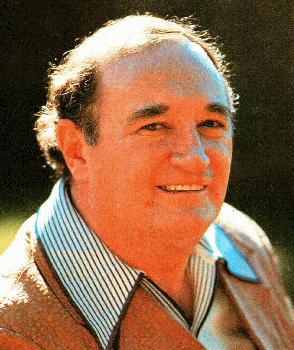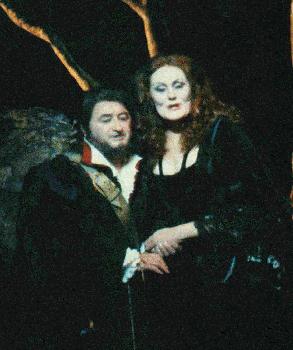Donald Smith was born in rural Queensland, Australia. During the war he
joined the army and was wounded in action. He took up singing as an adjunct
to his studies as an industrial chemist, first appearing on stage in Edward
German's Merrie England before enlisting. After the war he sang roles with
the Brisbane Opera Society, in Faust, Carmen, Rigoletto, Butterfly, Roméo
et Juliette, Pagliacci and most remarkably in the rarities Maritana and
Bohemian girl, which retained some popularity at that time. He won the
prestigious Mobil Quest in 1952 and went abroad to study at the London Opera
School.
In 1955 he sang minor roles with the touring Italian Opera Co, moving to
soloist in the fledgling Elizabethan trust Opera Co., the fore-runner of the
present Opera Australia. In 1958 he sang Bob Boles in Peter Grimes and
thenceforth moved to leads such as Almaviva (Barbiere), Tamino, il Duca and
Pinkerton as well as Belmonte in an early ABC television production of
Entführung.
He moved to London, singing principally at Sadler's Wells Opera with roles
in Carmen, Fanciulla del West with compatriot Elizabeth Fretwell, Ernani,
Attila, Rigoletto, The bartered bride, Un ballo in maschera and La forza del
destino. Outside this theatre he sang Calaf with Amy Shuard at Covent Garden
(1965), Riccardo/Gustavus in Mexico City (1966) and, further off the beaten
track, Corrado in Verdi's Il corsaro at St Pancras.
In 1966 he sang a magnificent Manrico in Sydney and began to return
regularly to his homeland. By 1969 he had returned
permanently. In this period there was not a more popular resident singer in Australia and as his voice became richer
his roles expanded into heavier
roles. Every performance of his became a special event, particularly where
he was directed into roles that suited his histrionic abilities. His acting
was not subtle but muscularly direct and he could portray forceful
characters with a dangerous intensity, both physically and vocally.
He was not afraid to sing in an ugly way where the situation demanded
but the rich treacle of his voice could also caress as Gustavus or
Cavaradossi. One of my most memorable moments in the theatre was his smooth,
honeyed tones filled with longing on the words "Sovra una terra estrania" etc
from the act 3 duet in Aida where the whole opera audience held its
collective breath, so seductive was the sound. Yet his Luigi (Tabarro) or
Dick Johnson could be full of violent and dramatic vocalism. Probably his
greatest dramatic success was in Pagliacci where his violence and strength
of voice were such in the final scene that it was surprising to see the
Nedda and Silvio still alive to take curtain calls.
Roles in Australia between 1966 and 1981:
1966 Trovatore
1967 Rigoletto, Turandot
1968
Fanciulla, Tosca with Collier and Gobbi (also the first theatrical
telecast of an opera in Australia from Adelaide, S.A.) and later in Sydney
with Antonietta Stella
1969 Ballo in maschera, Madama Butterfly
1970 Forza del destino, Faust
1972 Pagliacci
1973 Cavalleria (in
double bill with Pagliacci), Verdi Requiem, Il tabarro
1974 Tosca
1975 Aida, Ballo in maschera, Rigoletto
1976 Aida, Carmen
1977
Carmen
1978 Fliegender Holländer (Erik)
1979 Fidelio, Fanciulla
del West
1980 Nabucco (the tiny role of Ismaele), I
masnadieri (with Joan Sutherland). During the run of this production he
was overtaken by an illness he had been developing for several years and had
to leave after three and a half performances. Despite his fans' hopes for
recovery, he permanently retired from the Australian Opera.
He moved back to Queensland where he taught singing at Queensland
conservatory until a stroke in 1988 affected his voice. In 1981 he made his
final stage appearances with the Queensland Opera Company in Samson et
Dalila with Margreta Elkins. For the last years of his life he lived in a
retirement home with his wife Joy. He died in December 1998. His son under
the name of Robin Donald also sang in London and Australia and they appeared
together in the 1975 Rigoletto with RD as Borsa.
Although Australia has produced a number of remarkable tenors (Ronald
Dowd, Ken Neate, Albert Lance), only Smith is remembered as a model for full
blooded Italian singing and even now, nearly twenty years after he last
sang, new tenors at the Opera House are compared to him and often found
wanting. His big Italian sound was perfectly suited for the grand roles and
it is a shame that the company did not use him in roles where he could be
more fully extended, e.g. Gioconda, Don Carlo, Andrea Chénier and even
Otello.
He recorded excerpts from Carmen, Rigoletto and The bartered bride at
Sadler's Wells for EMI and four LPs of arias, songs, operettas and religious
songs in Australia. Only one EMI CD has been issued of these (166283 2)
although the Carmen excerpts were briefly released on Price-Less D16522. Numerous
private complete opera recordings exist but are not generally available.

